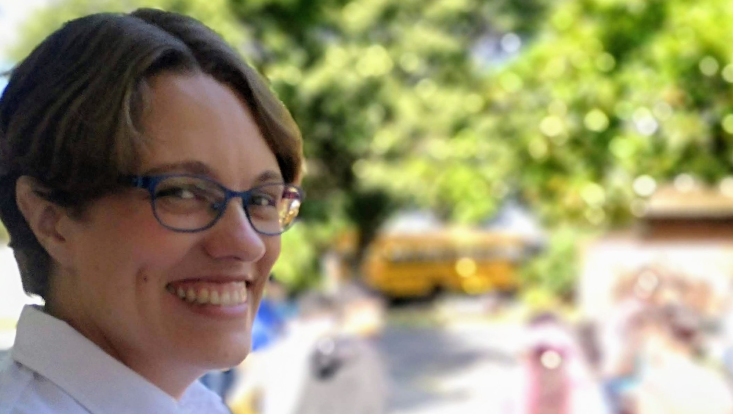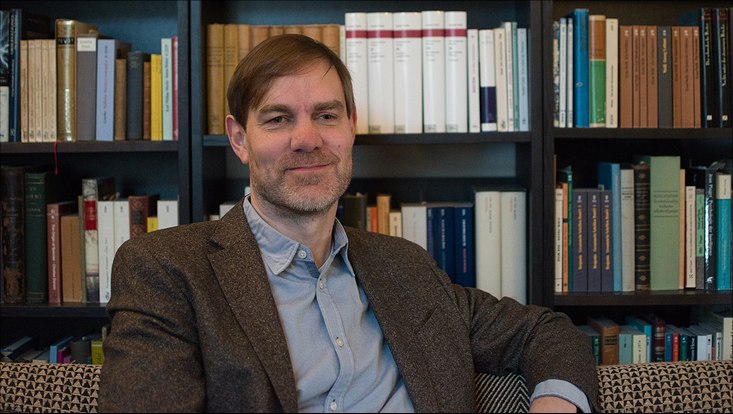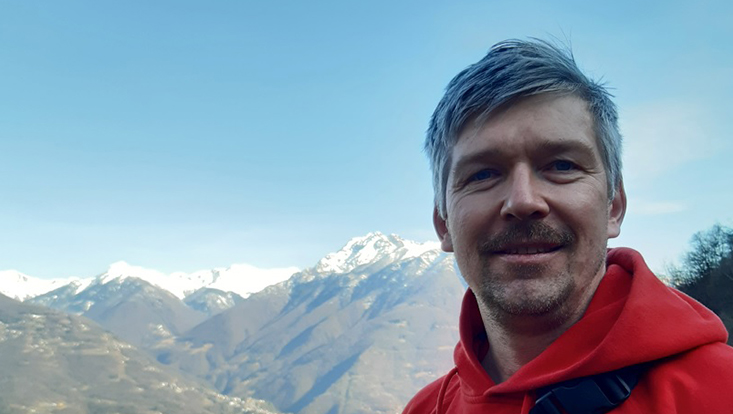“Welcome Aboard!”“How can marginalized children and adolescents access educational opportunities?”Prof. Dr. Christine Schmalebach strengthens the Faculty of Education.
24 February 2022, by Schalenbach/Gießelmann

Photo: Harold Monterrosa
Every year, Universität Hamburg welcomes numerous new researchers. This series introduces them and their areas of research. This time: Prof. Dr. Christine Schmalenbach.
In Winter Semester 2021/22, Prof. Dr. Christine Schmalenbach left the Universidad Internacional Nehemías in El Salvador for Hamburg, where she holds a junior professorship in the Faculty of Education, with a focus on special needs education—learning and emotional-social development.
My research area in 3 sentences:
I am fundamentally interested in teaching approaches that enable participation, especially for children growing up in challenging conditions, that are suitable to heterogeneous classrooms, and that combine social-emotional learning and knowledge acquisition. I focus on cooperative learning approaches, for example in the LIFE program, a service learning project in El Salvador, or the SeEle program.
I developed this program together with 3 colleagues from Germany. We consolidated the didactic approaches of cooperative learning and “learning ladders” that hails from the Rishi Valley in India and developed material to support social-emotional learning from the lower secondary education I level. Accordingly, students can work at their own pace on topics such as emotions, friendship, cooperation, and conflict. Especially with regard to the focal areas of learning and emotional-social development, we still need to do a lot of research on these promising approaches.
I am also interested in how (future) teachers can receive support for lesson design that facilitates the active and holistic learning of all students. A cross-cutting topic that always arises in these projects and lines of inquiry is the relevance of culture and context when implementing pedagogical and didactic approaches.
This is how I explain my research to my family:
Ultimately, it is about creating conditions that enable all children and adolescents, including those who face special challenges in life, realize their potential as far as possible.
My research is important for society because:
My work is about inclusion and societal participation, meaning I ask: how can educational opportunities be designed such that all children and adolescents, including those facing special challenges in life, can take part and develop the strategies and skills they need to successfully navigate life? I look at a few aspects of this broad line of inquiry in my own research projects. In the training of and cooperation with teachers, I would like to encourage them to revisit these questions constructively and critically and to apply academically sound solutions to their own teaching.
This is why students should come to my lectures:
I am a teacher myself and I like to teach—I hope that students notice that in my classes and feel inspired by my enthusiasm for the exciting process of planning lessons. If the format allows, my courses are interactive and cooperative and they facilitate critical examination with authentic materials and the integration of one’s own experiences. Naturally, this is more feasible in seminars than in lectures.
A quote by Paulo Freire (1998) has inspired me for years: “One of the most important tasks of critical educational practice is to make possible the conditions with which the learners, in their interaction with one another and with their teachers, engage in the experience of assuming themselves as social, historical, thinking, communicating, transformative, creative persons; dreamers of possible utopias, capable of being angry because of a capacity to love.” From my students and from myself, I expect us to engage with this process as learners and (future) teachers.
These are my plans at Universität Hamburg (with regard to knowledge exchange, teaching, etc.):
I would like to cooperate here in Germany with practicing teachers and create space for exchange between academics and practitioners. I would also be happy to be part of the cooperation with Latin American institutions and to build upon these. Overall, I have profited a great deal from international and intercultural exchange—I can contribute the insight I have gained into different perspectives on the topic.
Reaching out to the world: I work with the following international and federal institutions and universities:
I will continue from here to cooperate with the Asociación Centro Nehemías (ACN) / Universidad Internacional Nehemías (UIN) in El Salvador. The Faculty of Education cooperates with the Universitat de Barcelona, Universidad El Salvador, and several other universities in Mexico, Columbia, and Italy in a Salvadorian doctoral program on education, human rights, and peace culture. I am taking part in this project and I am delighted that I can continue to cultivate my connections to El Salvador and Latin America in this way.
My work is also influenced by exchange with NGOs in other countries that have developed exciting didactic and pedagogical concepts in their own practical work, especially IFEJANT (Instituto de Formación para Educadores de Jóvenes, Adolescentes y Niños Trabajadores de América Latina y el Caribe) in Peru and RIVER (Rishi Valley Institute for Educational Resources) in India.
I pursued my last projects in cooperation with colleagues at the University of Erfurt, the University of Siegen, and the University of Würzburg; based in El Salvador, they were all definitely international. Through the IASCE (International Association for the Study of Cooperation in Education), the IAIE (International Association for Intercultural Education) , and my regular participation in the ICQI (International Congress of Qualitative Inquiry), I have gotten to know very different colleagues from all over the world. My exchange with them throughout the years has always inspired me anew and enriched my work. Currently, for example, I am working with Rachel Lotan, a retired professor from Stanford University, on a paper about complex lessons.
In Hamburg, the city and the University, I am looking forward to:
I am looking forward to the cultural diversity and the international connections. I grew up between cultures myself—among other cultures the various cultures of Mexico—and I have moved often in my life. Hamburg seems to me to be a place where these various parts of myself will have space and where I can feel at home.
See the Faculty of Education’s website for an in-depth interview with Prof. Schmalenbach.


